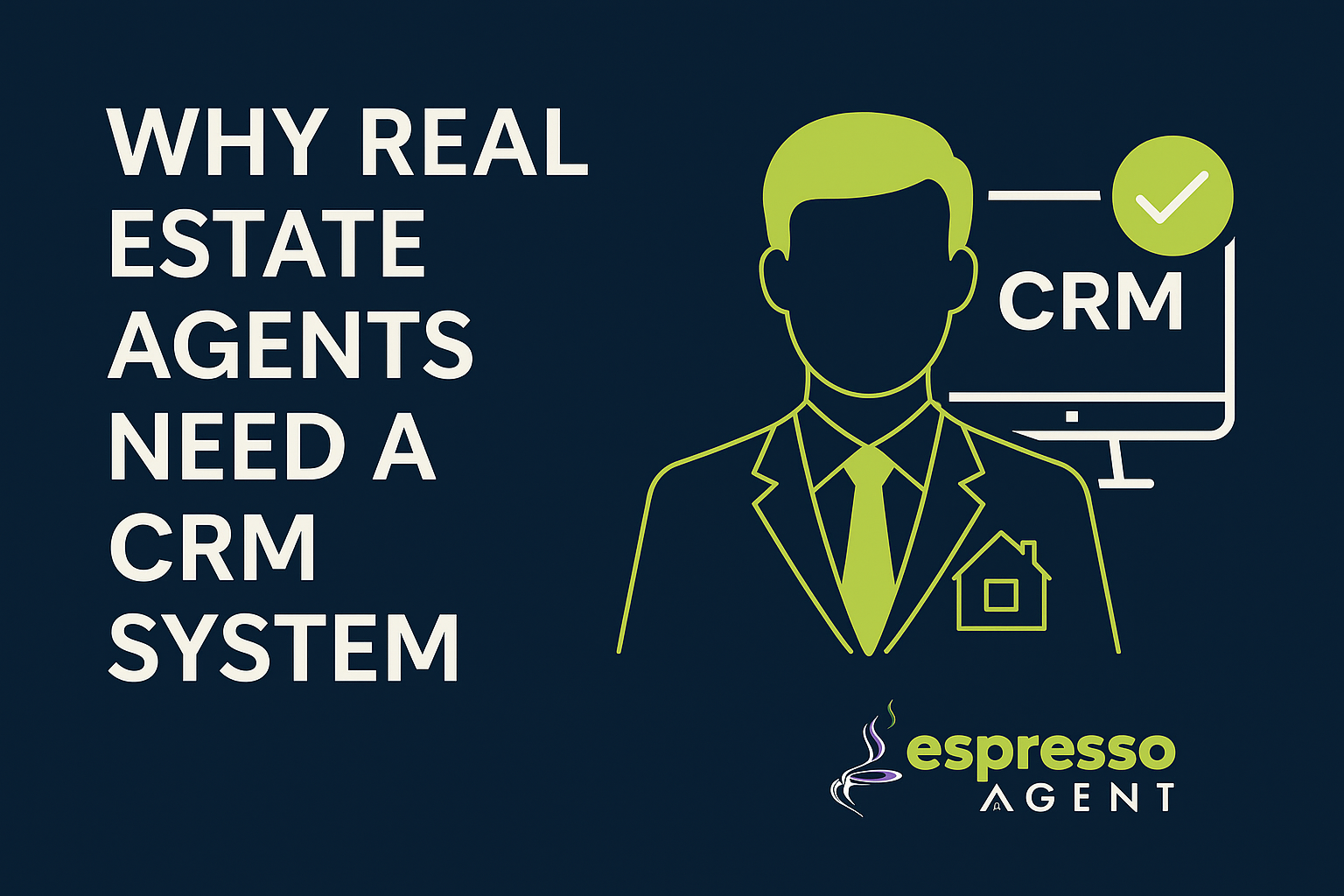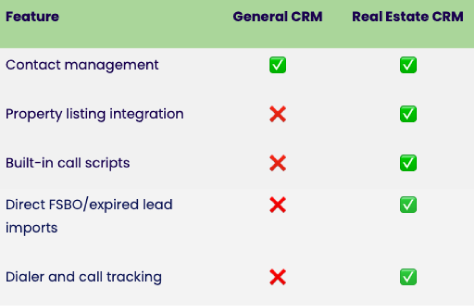Why Real Estate Agents Need a CRM System
Discover why every agent needs a real estate CRM. Organize leads, automate follow-ups, and grow business faster with Espresso Agent’s all-in-one solution.
.png)
Why Real Estate Agents Need a CRM System

In a fast-moving housing market, agents juggle dozens of conversations, showings, and deadlines. And as much as we all love using them, spreadsheets and sticky notes can’t keep pace.
A real estate CRM provides the central hub every modern real estate business needs, bringing contacts, follow-ups, and deals together in one organized place.
With the right CRM, agents can:
- Track every lead and client interaction
- Automate reminders and follow-ups
- Personalize outreach so prospects feel known and valued
- Monitor the entire pipeline and plan the next move with confidence
This guide explores the benefits of CRM in real estate, outlines best practices, and highlights how Espresso Agent supports top-performing agents.
Key Takeaways [TL;DR]
✔️ A CRM centralizes leads - FSBOs, expired listings, sphere of influence - so nothing slips through the cracks.
✔️ New contacts from websites, open houses, or social ads drop straight into the database and are tagged automatically.
✔️ Automated emails, texts, and call reminders keep follow-up consistent and timely.
✔️ Pipeline dashboards reveal where each deal stands and which marketing channels produce the best results.
✔️ Espresso Agent’s real estate CRM combines lead generation, a power dialer, and scripts in a single platform.
What Is a Real Estate CRM?
A CRM is essentially a digital system for tracking relationships.
A real estate CRM goes further, tailoring tools to the property market where timing and personal relationships drive every transaction.
Key differences from generic sales CRMs include:

A dedicated system like Espresso Agent CRM integrates prospecting, calling, and follow-up, so agents can manage the full client journey without separate apps or manual spreadsheets.
With that out of the way, let’s see how real estate CRM can make your life easier.
1. Organize and Centralize Every Lead
Disorganized contacts mean missed opportunities. A CRM keeps every FSBO, expired listing, referral, and sphere-of-influence contact in one secure database.
Benefits include:
- Automatic storage and updates for each lead
- Smart tagging and filters to identify hot prospects
- At-a-glance daily priorities for calls and follow-ups
This structure eliminates guesswork and ensures no lead is forgotten.
2. Capture Leads the Moment They Arrive
Today’s leads appear around the clock through web forms, social media, and live events. Manual data entry risks delays or lost opportunities.
A real estate CRM:
- Syncs web and landing page forms directly to the database
- Instantly tags and assigns new contacts
- Launches automated welcome emails or nurturing sequences
Integrated motivated seller lead generation tools in Espresso Agent provide fresh FSBO, expired, and FRBO leads each morning, ready for immediate action.
3. Automate Consistent Follow-Ups
Consistent follow-up converts interest into appointments and listings. Without automation, even the best intentions can fall behind.
A CRM simplifies follow-up by:
- Scheduling calls and reminders
- Sending pre-written drip emails and text campaigns
- Tracking every interaction so agents know when and how to re-engage
Espresso Agent CRM includes built-in campaigns and scripts, so follow-up stays on track while leaving time for high-value client conversations.
4. Improve Time Management and Productivity
Hours spent shuffling paper or searching for numbers are hours not spent selling. Real estate CRM tools streamline daily workflows so agents can focus on revenue-generating tasks.
Key advantages:
- Build targeted call lists directly in the power dialer
- Automate appointment reminders and routine emails
- Create a clear, prioritized schedule for prospecting and client care
The result is a more efficient day and better work–life balance.
5. Personalize Communication to Strengthen Relationships
Real estate transactions are personal and often emotional. Generic outreach rarely builds trust. A CRM supports personalization by:
- Storing details such as birthdays, favorite neighborhoods, and long-term plans
- Allowing tailored messages and property recommendations
- Turning routine check-ins into meaningful relationship builders
Thoughtful, individualized contact increases repeat business and referrals.
6. Gain Full Visibility into the Sales Pipeline
Forecasting income and planning marketing spend requires a clear picture of current deals. A real estate CRM provides:
- Pipeline dashboards showing each stage from lead to closing
- Conversion reports to identify effective campaigns
- Real-time metrics to guide budget and resource decisions
Use that data to refine your processes and improve.
7. Increase Listing Conversion Rates
Many homeowners think about selling for months before they list. Regular, well-timed communication keeps an agent top-of-mind until the client is ready.
CRM tools make it easy to:
- Track early inquiries and schedule periodic market updates
- Deliver automated neighborhood reports
- Maintain steady, value-driven contact
This steady presence often determines who wins the listing appointment.
Why Espresso Agent’s CRM Is Purpose-Built for Real Estate
Not all CRMs meet the unique needs of real estate professionals. Espresso Agent combines a powerful CRM with integrated prospecting and marketing tools.
Highlights include:
- Daily FSBO, FRBO, pre-foreclosure, and expired leads
- Built-in scripts, email templates, and campaigns designed for real estate
- Smart tagging, sorting, and geographic filters
- Automated dialer, call tracking, and in-depth performance reports
Everything - prospecting, calling, follow-up, and reporting - runs inside one platform.
Best Practices for Getting the Most from a CRM
A CRM delivers the best results when it becomes part of the daily routine.
Here’s how to make the most of your CRM system:
- Update and tag contacts every day to keep data accurate.
- Segment by lead source and urgency to focus prospecting.
- Automate repetitive tasks like drip campaigns and appointment reminders.
- Review performance weekly to measure conversions and refine strategy.
- Add detailed notes after every interaction for future personalization.
These small, consistent steps transform a CRM from a database into a growth engine.
The Bottom Line
For modern real estate professionals, a CRM is no longer optional.
It organizes contacts, captures leads instantly, automates follow-up, and provides the pipeline visibility needed to close more deals with less stress.
Choosing a purpose-built platform like Espresso Agent means everything from prospecting expired listings to sending targeted email campaigns lives in one system designed specifically for agents.
With the right CRM, staying organized and building lasting client relationships becomes part of the daily workflow, not an after-hours chore.
👉 Get started with Espresso Agent today.
%20(1).png)
Should You Hire a Real Estate Coach?
Wondering if a real estate coach is worth it? Learn costs, benefits, and how to decide if coaching fits your business stage.
.jpeg)
The Risks & Rewards of Prospecting Distressed Properties
Learn how to find distressed properties, reach motivated homeowners, and use Espresso Agent’s tools to manage outreach with clarity and confidence.
.jpeg)
Buyer's Market vs. Seller's Market In Real Estate
Buyer’s market vs seller’s market explained. Learn the key differences and how agents should adjust strategies in any market.


